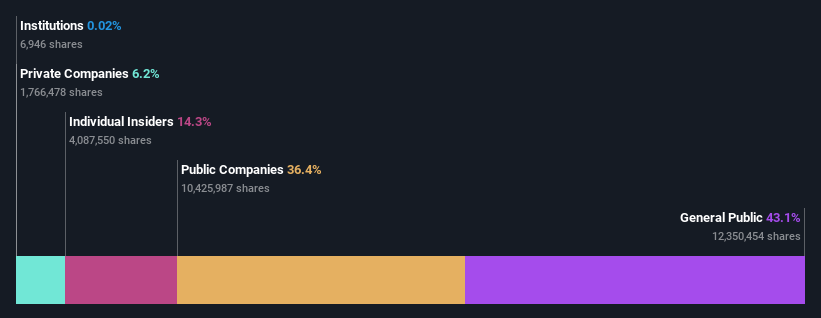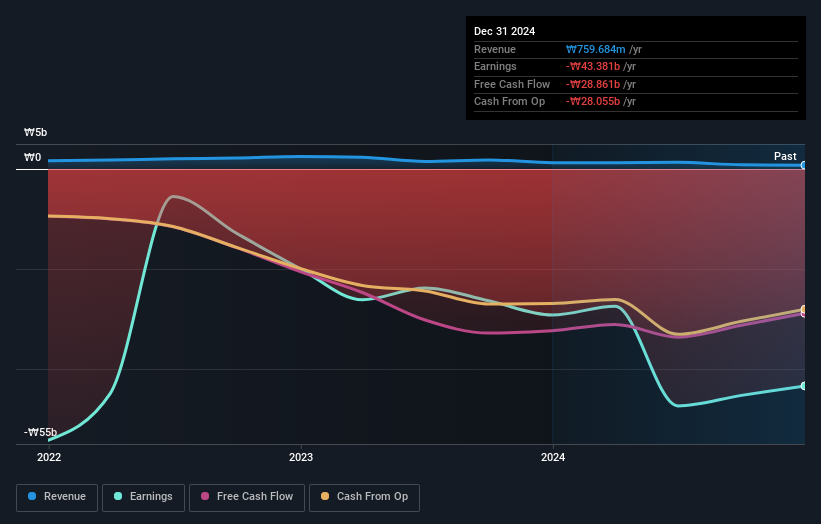- South Korea
- /
- Biotech
- /
- KOSDAQ:A203400
Individual investors in ABION Inc. (KOSDAQ:203400) are its biggest bettors, and their bets paid off as stock gained 11% last week

Key Insights
- Significant control over ABION by individual investors implies that the general public has more power to influence management and governance-related decisions
- The top 4 shareholders own 51% of the company
- Insider ownership in ABION is 14%
Every investor in ABION Inc. (KOSDAQ:203400) should be aware of the most powerful shareholder groups. We can see that individual investors own the lion's share in the company with 43% ownership. That is, the group stands to benefit the most if the stock rises (or lose the most if there is a downturn).
As a result, individual investors collectively scored the highest last week as the company hit ₩187b market cap following a 11% gain in the stock.
Let's delve deeper into each type of owner of ABION, beginning with the chart below.
View our latest analysis for ABION

What Does The Lack Of Institutional Ownership Tell Us About ABION?
Institutional investors often avoid companies that are too small, too illiquid or too risky for their tastes. But it's unusual to see larger companies without any institutional investors.
There are many reasons why a company might not have any institutions on the share registry. It may be hard for institutions to buy large amounts of shares, if liquidity (the amount of shares traded each day) is low. If the company has not needed to raise capital, institutions might lack the opportunity to build a position. On the other hand, it's always possible that professional investors are avoiding a company because they don't think it's the best place for their money. ABION might not have the sort of past performance institutions are looking for, or perhaps they simply have not studied the business closely.

ABION is not owned by hedge funds. The company's largest shareholder is TELCON RF PHARMACEUTICAL. Inc., with ownership of 32%. Meanwhile, the second and third largest shareholders, hold 8.1% and 5.9%, of the shares outstanding, respectively. Young-Gi Shin, who is the second-largest shareholder, also happens to hold the title of Chief Executive Officer.
Our research also brought to light the fact that roughly 51% of the company is controlled by the top 4 shareholders suggesting that these owners wield significant influence on the business.
Researching institutional ownership is a good way to gauge and filter a stock's expected performance. The same can be achieved by studying analyst sentiments. We're not picking up on any analyst coverage of the stock at the moment, so the company is unlikely to be widely held.
Insider Ownership Of ABION
While the precise definition of an insider can be subjective, almost everyone considers board members to be insiders. Company management run the business, but the CEO will answer to the board, even if he or she is a member of it.
I generally consider insider ownership to be a good thing. However, on some occasions it makes it more difficult for other shareholders to hold the board accountable for decisions.
It seems insiders own a significant proportion of ABION Inc.. It has a market capitalization of just ₩187b, and insiders have ₩27b worth of shares in their own names. We would say this shows alignment with shareholders, but it is worth noting that the company is still quite small; some insiders may have founded the business. You can click here to see if those insiders have been buying or selling.
General Public Ownership
The general public, who are usually individual investors, hold a 43% stake in ABION. While this group can't necessarily call the shots, it can certainly have a real influence on how the company is run.
Private Company Ownership
Our data indicates that Private Companies hold 6.2%, of the company's shares. It's hard to draw any conclusions from this fact alone, so its worth looking into who owns those private companies. Sometimes insiders or other related parties have an interest in shares in a public company through a separate private company.
Public Company Ownership
It appears to us that public companies own 36% of ABION. This may be a strategic interest and the two companies may have related business interests. It could be that they have de-merged. This holding is probably worth investigating further.
Next Steps:
While it is well worth considering the different groups that own a company, there are other factors that are even more important. To that end, you should be aware of the 4 warning signs we've spotted with ABION .
If you would prefer check out another company -- one with potentially superior financials -- then do not miss this free list of interesting companies, backed by strong financial data.
NB: Figures in this article are calculated using data from the last twelve months, which refer to the 12-month period ending on the last date of the month the financial statement is dated. This may not be consistent with full year annual report figures.
New: Manage All Your Stock Portfolios in One Place
We've created the ultimate portfolio companion for stock investors, and it's free.
• Connect an unlimited number of Portfolios and see your total in one currency
• Be alerted to new Warning Signs or Risks via email or mobile
• Track the Fair Value of your stocks
Have feedback on this article? Concerned about the content? Get in touch with us directly. Alternatively, email editorial-team (at) simplywallst.com.
This article by Simply Wall St is general in nature. We provide commentary based on historical data and analyst forecasts only using an unbiased methodology and our articles are not intended to be financial advice. It does not constitute a recommendation to buy or sell any stock, and does not take account of your objectives, or your financial situation. We aim to bring you long-term focused analysis driven by fundamental data. Note that our analysis may not factor in the latest price-sensitive company announcements or qualitative material. Simply Wall St has no position in any stocks mentioned.
About KOSDAQ:A203400
ABION
Operates as a pharmaceutical biotech Company in South Korea and internationally.
Slight with worrying balance sheet.
Market Insights
Community Narratives



